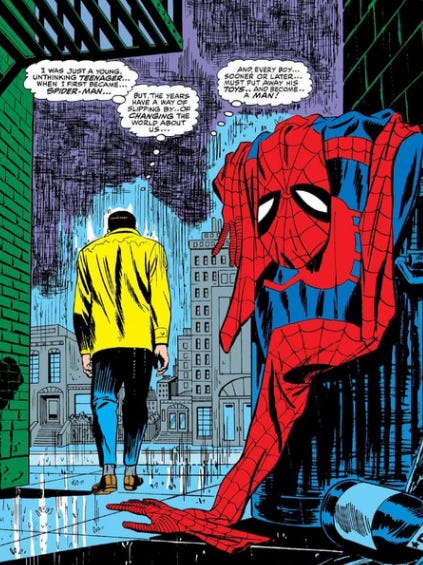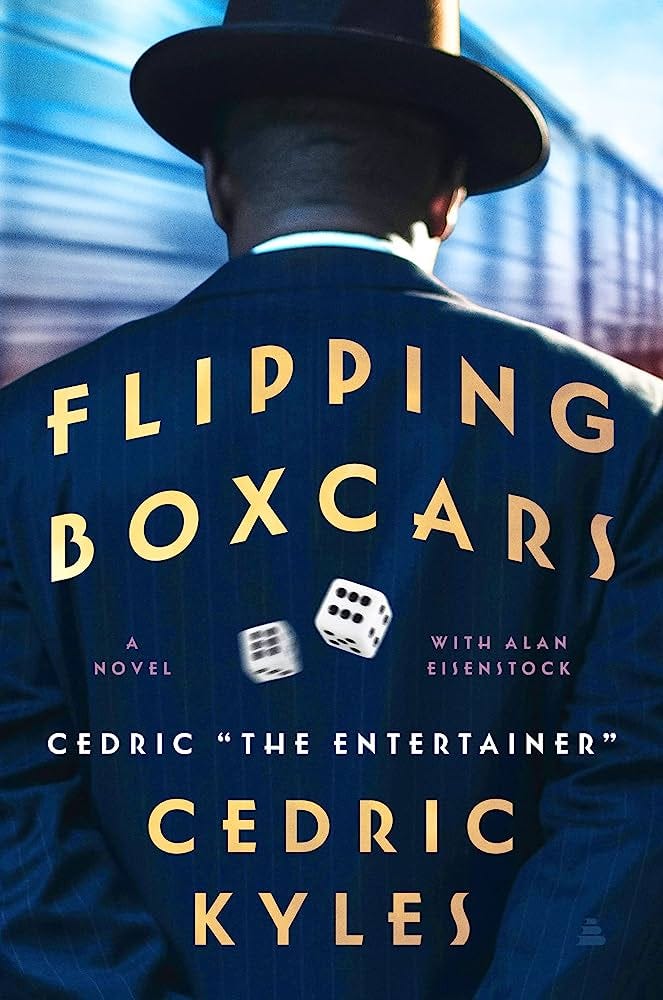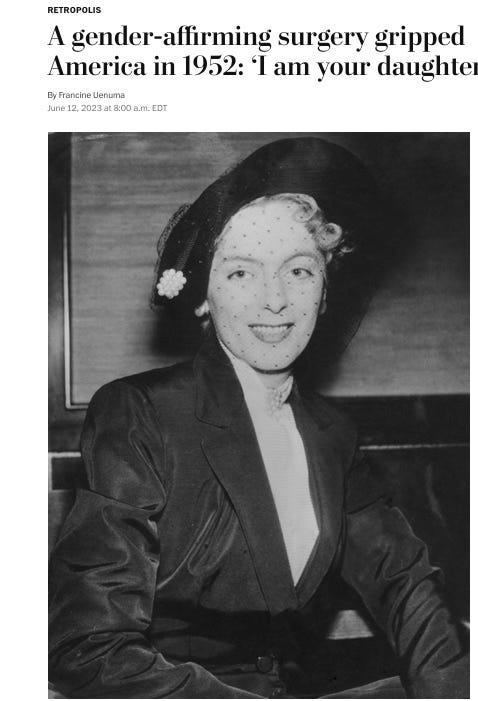IP Picks🔎: Alien 'Abductions' and an African CIA Assassination
A FREE sample of The Optionist, our standalone IP newsletter

Ed note: Our standalone newsletter about available intellectual property, The Optionist, just celebrated its one-year anniversary. In that time, dozens of projects straight out of our column have been optioned by Hollywood producers, writers and development teams. Writer Andy Lewis, week after week, trains his fine eye on the best material, past and present, ready to have its turn on the screen. Today we present Andy's latest column of excellent recommended and available IP, fiction and non-fiction filled with suspense, world-building and drama. All of which his paid subscribers read first.
Welcome to a special edition of The Optionist.
This month has brought the passing of several giants: editor Robert Gottlieb, author Cormac McCarthy and comic artist John Romita. If you missed them, I wanted to flag their obituaries. Each lived interesting and consequential lives that influenced Hollywood.
If not the best American novelist of his generation, McCarthy, of course, belonged on a short list of three or four for that honor. His beautiful yet brutal books — often set in the Southwest — became the basis for six movies, including The Road, All the Pretty Horses and the Oscar-winning No Country for Old Men.
There are many great McCarthy stories, but I particularly like the one he shared with Oprah in 2007 about how creative inspiration struck him when he was on vacation in El Paso with his son, and then reappeared years later, resulting in the Pulitzer Prize-winner The Road: "One night, John was asleep — it was night, it was probably about two or three o'clock in the morning — and I went over and I just stood and looked out the window at this town. I could hear the trains going through and that very lonesome sound. I just had this image of these fires up on the hill and everything being laid waste and I thought a lot about my little boy. And so I wrote those pages and that was the end of it. And then about four years later I was in Ireland and I woke up one morning and I realized it wasn't two pages in another book — it was a book. And it was about that man and that little boy."
Gottlieb, who was 92, was an editor at Simon & Schuster, Knopf and the New Yorker for decades. The list of authors he edited reads like a who's who of 20th-Century greats, and he demonstrated an impressive eye for both pop and high-brow, fiction and non-fiction: John le Carré, Toni Morrison, John Cheever, Michael Crichton, Ray Bradbury, Barbara Tuchman and Bill Clinton. Perhaps his most famous and long-standing relationship was with writer Robert Caro, which spanned some 50 years and was the subject of Turn the Page, a great 2022 documentary. (Totally worth a watch if you've never seen it.)
Unless you're a comic geek, the name John Romita, who was 93 at the time of his passing, might not be immediately familiar to you but you've surely seen his art, like this iconic image, to which director Sam Raimi paid homage in Spider-Man 2.
Sandwiched between the fluid work of creator Steve Ditko in the ’60s and the flashy style of Todd McFarlane in the ’90s, Romita's unfussy art didn't always get the acclaim it deserves, but for those whose first exposure to Spider-Man came in the ‘70s and ‘80s (and that includes a very high percentage of the people who helped adapt him for the screen), Romita’s art defined the idea of Spider-Man. And it wasn't just Spider-Man; Romita became Marvel's art director in 1973, a position he held for about two decades, and in that role helped shape the look of such iconic characters as Punisher, Luke Cage and Wolverine. There's no doubt that after the initial burst of creativity by Ditko, Jack Kirby and others in the early 1960s that created the Marvel Comics universe, Romita was perhaps its most influential artist.
On to this week’s picks, which run the gamut from alien ‘abductions’ to a period heist comedy. The full rundown:
A historical drama about the first Americans to claim that they were abducted by aliens, and how that transformed them into wacky conspiracy theorists.
A period heist comedy about a small-town hustler plotting to rob a train to save his family’s finances.
A real-life spy drama about the CIA’s role in the assassination of Congolese leader Patrice Lumumba.
A potential biopic about the first American to undergo gender-reassignment surgery.
A true-crime comedy about a psychic grifter who conned a sheikh out of $90 million.
BOOKS I LIKE (current)
History/True Sci-Fi
For fans of The X-Files
Potential logline: How Betty and Barney Hill, the first Americans to claim being abducted by aliens, transformed from a nice churchgoing suburban couple into wacky conspiracy theorists.
The Abduction of Betty and Barney Hill: Alien Encounters, Civil Rights, and the New Age in America by Matthew Bowman (Yale, Aug.) I already had this book on my radar before the recent burst of UFO news — is the government hiding evidence of aliens? This whistleblower says "yes", and only furthered my curiosity. I'll confess, I didn't know this story about the first modern claim of alien abduction by a N.H. couple in 1961, but it’s famous enough to be the inspiration for some TV episodes, docs and even a 1975 TV movie (starring James Earl Jones and Estelle Getty as the interracial Hills!). However, I think Bowman's book offers a modern take that might appeal to today's audience. The basic story has late-thirtyish couple Betty and Barney Hill supposedly seeing a UFO while driving home one night. They reported what happened, but government officials didn't take them seriously, suggesting it was perhaps all in their heads. As people doubted the Hills’ story, it became more elaborate from supposed memories recovered during hypnosis to include not just a sighting, but abduction as well. Betty, who was the more passionate of the two, turned to fringe New Age groups and started to embrace wilder conspiracy theories. (Barney died in 1969 at 47.) By the time of her death in 2004, Betty was a notorious conspiracy theorist who claimed black helicopters were surveilling her, and had alienated all but the most hard-core UFO-ologists. Bowman's spin — and why I think it works for audiences right now — is to eschew figuring out what "really" happened that night in favor of exploring how Betty became alienated from mainstream authority and gravitated to fringe conspiracy theories because people doubted her UFO story. TL/DR for modern audiences: How does an ordinary American who went to church regularly, was a community fixture in her small town and supported conventional liberal causes of the time like the civil rights movement, fall down the QAnon rabbit hole? There's been another Hill project kicking around for a couple of years — it started as a movie but was reconceived as a TV series — that hasn't gotten off the ground. But Bowman's book is much stronger underlying IP IMHO. The other book is by a nuclear physicist-turned-UFO-ologist trying to "prove" it actually happened. Bowman's exploration of how people become conspiracy theorists is a much more interesting and relevant spin on the story. REPS: Giles Anderson/Anderson Lit.
Heist/Comedy
For fans of Ocean’s 11
Potential logline: In 1940s Missouri, small-time hustler Babe Royce plots to steal $50K of booze off a train to save his family’s finances.
Flipping Boxcars by Cedric Kyles with Alan Eisenstock (Amistad, Sept.) This a sweet and fun first novel from the “King of Comedy” known as Cedric the Entertainer, loosely inspired by his grandparents. It calls to mind classic ‘70s comedies from Black filmmakers and actors like Uptown Saturday Night and Bingo Long's Traveling All-Stars that I'm sure Cedric watched as a kid, mixed with heist tales like Ocean's 11. Set in 1948, it finds gambler/fixer Babe Royce with the opportunity to purchase a whole train boxcar of smuggled booze. He sees the profit as a chance to buy some land and ensure his family's future financial stability, but when his plan to win enough money for the deal playing dice goes belly up, he concocts a daring mid-transit heist to steal the cargo. The robbery plot is fun and Babe Royce is a charming rogue who makes a great lead character. The relationship between Royce and his wife, Rosie, is affectionate, and combined with the loving sketches of the small Missouri town where the story takes place and its Black community, it gives the book a warm nostalgic heart. All this is to say there's good world-building here. Even if there's a temptation to expand this, I think heist stories like this do best as compact narratives, so think movie, not limited series. Cedric hasn't committed to whether he'd want to produce this himself via his own shingle or partner with someone, so the rights are a bit more up in the air than usual. REPS: CAA
Spy Thriller/History
For fans of The Good Shepherd and Syriana
Potential logline: How the CIA and other Western spies plotted to overthrow and kill the popular leader of the newly independent country of Congo in the early 1960s.
The Lumumba Plot: The Secret History of the CIA and a Cold War Assassination by Stuart A. Reid (Alfred A. Knopf, Oct.) The basics of the Lumumba story — a populist reformer overthrown by the CIA during the Cold War over fears he'd align his country with the Soviet Union — has animated many spy thriller plots over the years. But the story that inspired all that fiction has never really gotten the screen adaptation it deserves. In 1960, amid a wave of decolonization that saw 17 countries gain independence, Patrice Lumumba, a charismatic thirtyish politician, became the prime minister of the new country of the Congo. But independence didn't go smoothly, owing to a variety of factors including disputes between ethnic groups, Belgium's mismanaged colonial rule and meddling from Western economic interests. On top of that, the American government mistook Lumumba's desire for independence and Congolese control over the economy as a sign he was aligning with the Soviets. The U.S., Belgium and Britain helped foment a coup that replaced Lumumba with Mobutu Sese Seko, a former soldier with strong ties to the U.S., and then facilitated Lumumba's execution. The CIA's role in the coup is the stuff of legends and a big reason why so many non-Western governments eye the U.S. suspiciously. Anyway, this story would make an awesome limited series — it's way too sprawling to be a movie — full of colorful characters. The core would be the CIA officers on the ground — some well-intentioned, some not — and Lumumba, but it would also include such far-flung characters as President Eisenhower and CIA director Allen Dulles, who decided Lumumba should go, the feckless Belgian leaders like King Baudouin and his deputy on the ground, Walter Jean Ganshof van der Meersch. It's a sprawling story for sure but one that I think can be thematically streamlined for American audiences by centering Lumumba as the good guy and harping on the West’s greedy desire to keep the profits from Congo's natural resources to themselves. (When in doubt, always fall back on the late, great NBC Sports impresario Don Ohlmeyer's dictum: "The answer to all your questions is money.") There are also a couple of CIA officers on the ground who opposed the coup who can be the hero POV for American audiences. One thread in Reid's book that I think would resonate with audiences is the folly of Washington's hubris in thinking that it could arrange and re-arrange the world to suit its needs without consequences. This is an awesome thriller, a tragedy for sure, but a thriller nonetheless — something reminiscent of the great political conspiracy thrillers of the ‘70s. Along with the late Harry Belafonte and Martin Scorsese, Ben Affleck has long been trying to develop a movie about the genocidal reign of Baudouin's great-grandfather Leopold II over the Congo in the late 1800s using the book King Leopold’s Ghost as IP. This story is the perfect bookend/sequel to that one and also something you could piggyback off informally to help promote this project. REPS: WME
JOURNALISM
History/LGBTQ+
For fans of The Danish Girl and Boys Don’t Cry
Potential logline: The life of the first American widely known to have undergone gender-reassignment surgery.
“A gender-affirming surgery gripped America in 1952: ‘I am your daughter’” by Francine Uenuma (The Washington Post, June 12, 2023) This piece sent me down a bit of a rabbit hole. I was surprised to find there's not a full-on contemporary biopic of Christine Jorgensen, who, in the early 1950s, became the first American widely known to undergo MTF gender-reassignment surgery. There's an outdated low-budget movie from the late ’60s based on her autobiography, but nothing since. It would make an awesome movie. The broad contours of the story are this: Jorgensen always felt like a woman in a man's body and because of that, never felt like she fit in anywhere. She was uncomfortable in a heterosexual male world (as when she served in the army in WWII), but also felt like gay wasn't an identity that captured her either. Soon, she started exploring hormone treatments on her own and traveled to Europe where the most advanced work on gender reassignment was being conducted. She returned to the U.S. in 1953 hoping to lead a quiet life, but a letter to her parents about her transition was leaked to the press and she became a huge media sensation. Jorgensen found some acceptance with her parents, famously, but also some resistance — she wasn't allowed to change her birth certificate from male to female. And of course there was America’s leering interest in the sex of it all at the expense of the psychological component. In the ’60s and ‘70s, she toured as a nightclub act and became a pioneering transgender activist before dying of cancer in 1987. The underlying IP is surprisingly scarce here. There's the autobiography, but like all autobiographies it's selective. There's a 2013 academic biography by a psychology professor that might work, and some book chapters, too. I think it’s also possible someone could write an original script without acquiring some underlying IP. I haven't done a deep rights check on the books; I really just wanted to flag this because of my surprise that no one had tackled this. Plus, the generally warm reception that Elliot Page’s memoir received last week underscored my hunch audiences would be interested in this story. (Also, Elliot: this could be a cool producing project for you. Just saying.) REPS: Imagine has a first look with the Post and then CAA. If you're interested, ping me and I can share more about the books.
True Crime/Grift/Heist
For fans of Dirty Rotten Scoundrels
Potential logline: The small-time psychic grifter who conned a Middle Eastern sheikh out of $90 million worth of jewelry.
“The Wild Story of the Psychic, the Sheikh and the $90 Million Diamond Heist” by Mitchell Prothero (Vice News, June 9) The headline doesn't lie: This is a wild story. It centers on Magdalena (no last name given), the personal assistant to Sheikh Hamad bin Jassim bin Jaber Al Thani, the former prime minister of Qatar and the longtime head of the country's $230 billion sovereign wealth fund. Magdalena was duped by an online psychic named John Lee, whom she connected with through a psychic site called Purple Garden. Florida-based Lee talked Magdalena into mailing him about $90 million worth of her boss’ jewelry — she sent it uninsured via FedEx to be cleansed of its bad "auras" which were causing her romantic and other personal problems. Unsurprisingly, Lee didn't return the jewelry. Instead, he tried to sell it through shady dealers, and one piece, a $35 million diamond, ended up at Christie's for sale, leading to his arrest. This is a fun grift tale with an international jewelry heist spin. Part of what makes the story is that the victim is a wealthy sheikh interested in keeping his name out of the press and the amateurish staff he had around him — it's hard not to see Magdalena as dopey for falling for this scheme, not to mention the fairly light security for the jewels. Or rather, the ways in which the ultra-wealthy bring otherwise total strangers into their inner circle. And then there's Lee, a small-time psychic grifter, who realized he'd stumbled onto a whale and was determined to milk it for all he could. I'm imagining this as an absurdist heist comedy in the spirit of something like A Fish Called Wanda. REPS: Vice News










